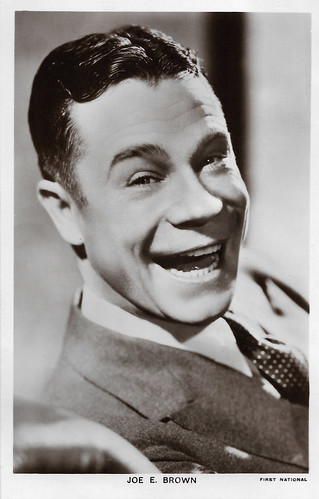
British postcard in the Picturegoer Series, London, no. 480a. Photo: First National.
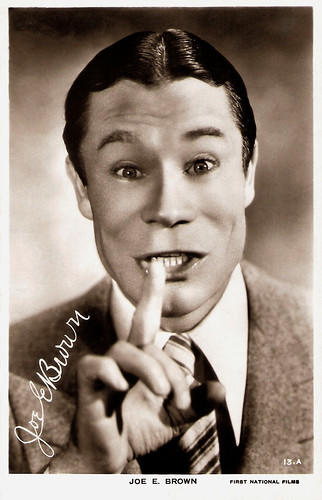
British Real Photograph postcard, no. 13. A. Photo: First National.
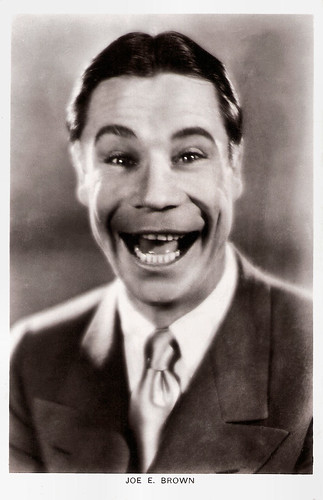
British postcard in the Picturegoer Series, London, no. 480.
Encouraged to run away with the circus
Joseph Evans Brown was born in Holgate, Ohio, in 1891 (according to IMDb 1892).
One of his proudest claims was that he was perhaps the only kid whose parents encouraged him to run away with the circus. In 1902, the 10-year-old Brown joined a circus tumbling act called the Five Marvellous Ashtons, with whom he started his vaudeville career.
He toured in burlesque in an acrobatic act, and also briefly played semi-professional baseball. His avid interest in baseball inaugurated a lifelong association with that sport which would include his participation in the National Vaudeville Artists ball team, his part-ownership of the minor league Kansas City Blues, and his providing pregame 'colour' for the televised New York Yankees games of the 1950s (Joe's son Joe L. became manager of the Pittsburgh Pirates in 1955).
On the verge of leaving vaudeville for Broadway in 1919, Joe discovered that Actors' Equity had called a strike; with very little hesitation, he grabbed a sign and joined the picket line. In 1920, Brown finally made it to Broadway as a comedian in the all-star review 'Jim Jam Jems'.
He went on to star in such New York productions as 'Captain Jinks' and 'Twinkle Twinkle'. In 1927, he began his film career in the short comedy Twinkle, Twinkle (1927). Uncharacteristically he appeared in turgid melodramas like Crooks Can't Win (George M. Arthur, 1928) until he was signed by Warner Bros. in 1929.
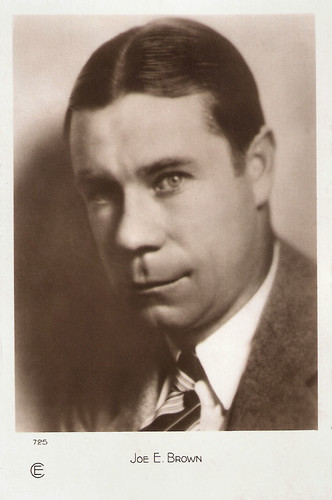
French postcard by Cinémagazine-Edition, Paris, no. 725.

British postcard by Film Weekly, London.
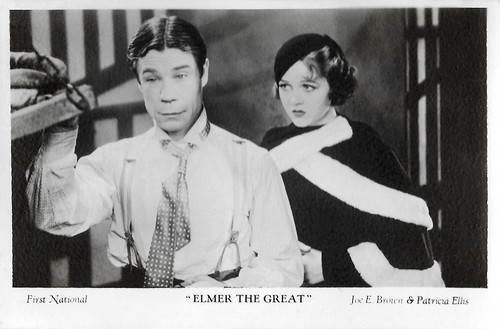
British postcard by Film Weekly, London. Photo: First national. Joe E. Brown and Patricia Ellis in Elmer, the Great (Mervyn LeRoy, 1933).
His huge mouth, cavernous grin, and drawn-out yell
Joe E. Brown became a favourite with child audiences and shot to stardom after appearing in the first all-colour all-talking musical comedy On with the Show (Alan Crosland, 1929). He starred in several lavish Technicolor Warner Brothers musical comedies including Sally (John Francis Dillon, 1929), Hold Everything (Roy Del Ruth, 1930), Song of the West (Ray Enright, 1930), and Going Wild (William A. Seiter, 1930).
In his popular Warners vehicles, Joe E. Brown alternated between playing naive young men who made good despite impossible odds, or brash braggarts who had to be taken down a peg or two. His trademark was his huge mouth, cavernous grin, and drawn-out yell.
Joe's best films were those in which he was permitted to display his athletic prowess, such as his 'baseball trilogy' Fireman Save My Child (Lloyd Bacon, 1932), Elmer the Great (Mervyn LeRoy, 1933) and Alibi Ike (Ray Enright, 1935).
Personally selected by Max Reinhardt to play Flute in the lavish Warners adaptation of William Shakespeare's A Midsummer Night's Dream (Max Reinhardt, William Dieterle, 1935), Brown easily stole the show from such formidable competition as James Cagney, Olivia de Havilland, Victor Jory, and Mickey Rooney. Another hit was Earthworm Tractors (Ray Enright, 1936).
During his Warner years, Brown and his wife began sponsoring promising college athletes: among Joe's proteges were UCLA football star (and later producer) Mike Frankovitch, and Olympic contestant (and future politician) Ralph Metcalfe. After ending his Warners contract in 1936, Brown starred for independent producer David Loew in When's Your Birthday? (Bob Clampett, Leon Schlesinger, 1937) and The Gladiator (Edward Sedgwick, 1938). In 1939, Brown testified before the House Immigration Committee in support of a bill that would allow 20,000 German Jewish refugee children into the US. He later adopted two refugee children.

Spanish postcard. Judy Canova and Joe E. Brown. Caption: Who's afraid of the fierce wolf? Collection: Marlene Pilaete.

Small collectors card, no. C 28. Photo: Republic Pictures.
Daffy millionaire Osgood Fielding III
By the early 1940s, Joe E. Brown's pictures were strictly in the 'B' category, though some of them, notably his brace of co-starring assignments with comedienne Judy Canova, had glimmers of the old Brown magic. He worked tirelessly entertaining troops in all corners of the world during World War II; their enthusiastic response enabled Brown to overcome the death of his son, Captain Donald Evans Brown, in a training accident.
After the war, Brown devoted most of his energies to stage work. In 1948, he was awarded a Special Tony Award for his work in the touring company of 'Harvey'. On-screen he played Captain Andy in the MGM remake of Show Boat (George Sidney, 1951) with Ava Gardner.
In 1961, he reprised the role on stage. He added television to his long list of accomplishments in the 1950s and 1960s. Most of Joe E. Brown's final film appearances were cameo roles, such as in Around the World in 80 Days (Michael Anderson, 1956), and It's a Mad, Mad, Mad, Mad World (Stanley Kramer, 1963).
The outstanding exception was his portrayal of daffy millionaire Osgood Fielding III in Some Like It Hot (Billy Wilder, 1959). Fielding falls for Daphne, played by Jack Lemmon in drag. At the end of the film, Lemmon takes off his wig and reveals to Brown that he is a man, to which Brown brings down the house by uttering the film's classic punchline: "Well, nobody's perfect."
Brown began having heart problems in 1968, after suffering a severe heart attack and underwent cardiac surgery. He died from arteriosclerosis in 1973 at his home in Brentwood, Los Angeles, California, three weeks before his 82nd birthday.

Vintage postcard, no. 383. Joe E. Brown in Show Boat (George Sidney, 1951).

Czech postcard by Pressfoto, Praha (Prague). Photo: Jack Lemmon and Joe E. Brown in Some Like it Hot (Billy Wilder, 1959). Collection: Carla Bosch.
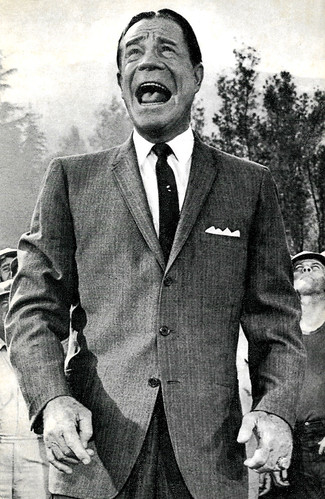
Romanian postcard by Casa Filmului Acin, no. 38. Photo: Joe E. Brown in It's a Mad Mad Mad Mad World (Stanley Kramer, 1963).
Sources: Hal Erickson (AllMovie), Wikipedia and IMDb.
No comments:
Post a Comment